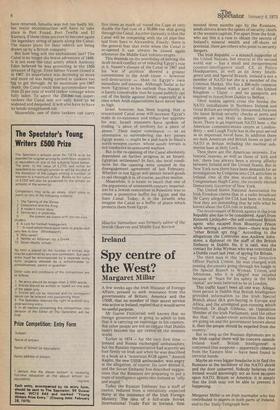Ireland
Spy centre of the West?
Margaret Millar
A few weeks ago the Irish Minister of Foreign Affairs, pressed to seek assurance from the governments of Britain, America and the USSR, that no member of their secret service was active in Ireland, replied that it would serve no useful purpose.
Mr Garret FitzGerald well knows that no foreign government is going to admit to him that it is carrying on espionage in his country. But other people are not so certain that Dublin hasn't become the spy centr6si3fthe western world.
Earlier in 1974 — for the very first time — Ireland and Russia exchanged ambassadors; but the Russian representative had scarcely set foot firmly on Irish soil when he was described in a book as a "notorious KGB agent." Anatoli Kaplin, the new USSR ambassador, was angry at the allegation, of course. He later denied it, and the Soviet Embassy has described suggestions that the Russians are preparing to put a team of intelligence agents into Ireland as "silly and stupid."
Today the Russian Embassy has a staff of twelve, reduced from a tentatively expected thirty at the insistence of the Irish Foreign Ministry. The idea of a full-scale Soviet International Trade Fair in Ireland, first mooted three months ago by the Russians, sends shivers down the spines of security chiefs in the western capitals. For apart from the Irish, who say this is a ruse to obtain the secrets of Ireland's mineral wealth and off-shore oil potential, there are others who point to security dangers.
The Irish Republic — a staunch supporter of the United Nations, but neutral in the second world war — has a small and inexperienced counter-intelligence staff, C3, at Police Headquarters, aTs well as its Army Intelli gence unit and Special Branch. Ireland is not a member of NATO but she is a member of the Common Market. She has a 200-mile common frontier in Ireland with a part of the United Kingdom — Ulster — and no passports are required to travel from Dublin to Belfast.
Oncehoitile agents cross the border the NATO installations in Northern Ireland and
Great Britain are implicitly threatened, forreven the latest British security checks at ports and airports are not likely to detect 'unknown' faces. There is an important NATO base — the American communications centre at London derry — and Lough Foyle has in the past served as an important naval base. In addition there are both American and British bases as part of NATO in Britain including the nuclear submarine base at Holy Loch.
Then there are the American interests. For historic reasons, as well as those of 'kith and kin,' there has always been a strong affinity between Ireland and the United States. But in New York now there have been demands for an investigation by Congress into CIA activities in Ireland. One of the men involved in this is Congressman Hugh Carey, the recently elected Democratic Governor of New York.
The United States National Association for Irish Freedom claims that in a radio broadcast Mr Carey alleged the CIA had been in Ireland. Now they are demanding that he tells what he knows about the CIA role in Ireland.
The involvement of British agents in the Irish Republic also has to be considered. Apart from Kenneth Littlejohn—the self-confessed British agent who escaped from Mountjoy Prison while serving a sentence there—there was the "other British spy ring." According to the allegations the Controller was Andrew Johnstone, a diplomat on the staff of the British Embassy in Dublin. He, it is said, was the contact for John Wyman who was convicted in a Dublin court last year, of spying for Britain.
The third man in this 'ring' was Detective Officer Patrick Crinon. He was charged with
passing documents going through his hails in the Special Branch to Wyman. Crinonr. and Johnstone, who it is alleged was recalled because of "fears for his safety in the Irish capital" are both believed to be in London.
This traffic hasn't been all one way. Allegations persist in Dublin that British Intelligence provided information to the Irish Special Branch about IRA gun-buying in Europe and Africa, and the attempted gun-running which followed. Dr Hugh Gibbons, an Opposition Member of the Irish Parliament, said the other day that: "if under-cover activities like these are going on and the government knows about it, then the people should be expelled from the country."
But so long as the Russian diplomats are in the Irish capital there will be concern outside Ireland itself. British Intelligences is concerned that weapons — apparently obtained from the Eastern bloc — have been found in terrorist hands.
Maybe an even bigger headache is to find the Russians at the backdoor of the NATO shield and the door unbarred, Nobody believes that Ireland would knowingly act as host taispies upon NATO, Britain or America: it is simply that the Irish may not be able to prevent it happening.
Margaret Millar is art Irish journalist who has contributed to papers in both parts of Ireland, and to the Daily Telegraph here


























 Previous page
Previous page